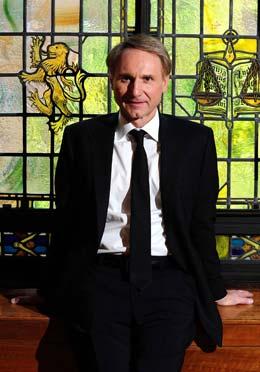Manila is no ‘gates of hell’

Author Dan Brown, left, has been blasted by officials in the Philippines for a quote in his latest novel Inferno, right, that likens the city to ‘the gates of hell’
Tolentino objected to the ‘gates of hell’ description, and to Manila being defined by what he calls terrible descriptions of poverty and pollution.
He said that the novel fails to acknowledge Filipinos’ good character and compassion.
‘Truly, our place is an entry to heaven,’ Tolentino said. ‘We hope that this letter enlightens you and may it guide you the next time you cite Manila in any of your works.’
The book Inferno includes a character who describes the capital as a city of horrible traffic jams, suffocating pollution, massive poverty and a thriving child sex trade.
The chairman of the government agency managing Manila, Francis Tolentino, sent a letter to Brown and his publishers criticising the “inaccurate portrayal of our beloved metropolis”.
While the book is fictional, an excerpt on the American author’s website stresses that “all artwork, literature, science, and historical references in this novel are real”.
“I’ve run through the gates of hell,” the character says after her experiences in Manila.
In his letter, copies of which were made public, Tolentino said he was “displeased” by the depiction of the capital, home to more than 1.65 million people.
He did not deny its huge slums and grinding poverty but said Brown had disregarded the strong Catholic faith of many residents as well as their “good character and compassion towards each other”.
“Truly our place is an entry to heaven,” the letter added.
Tolentino conceded this was not the first conflict between Brown and Manila. In 2006, the Manila city council banned screenings of the film adaptation of The Da Vinci Code, saying it was offensive to the Catholic church.
Brown’s works have also previously come under fire in the largely Roman Catholic Philippines, with bishops calling them “sacrilegious” for undermining church teachings.
However on cyberspace, some Filipinos were in agreement with the author’s portrayal.
“It looks like (Tolentino) is the one who hasn’t been to Manila,” one person tweeted.
Last month, the government announced that despite years of economic growth, 27.9 per cent of the Philippine population lived in poverty, a figure practically unchanged since 2006.
‘Inferno’ is already a best-seller a little over a week since its debut.
The story drawn partly from Dante’s epic again features Harvard symbologist Robert Langdon, the protagonist for Brown’s blockbuster ‘The Da Vinci Code’ and its follow-up ‘The Lost Symbol.’
In the book, Langdon’s companion depicts Manila as a city of ‘six-hour traffic jams, suffocating pollution, horrifying sex trade.’
‘I’ve run through the gates of hell,’ she said.
It’s not the first time that authorities have been angered by an unflattering description of the sprawling city of some 12 million people, where urban shanties and the homeless exist side by side with glitzy shopping malls and walled residential compounds.
In 1999, then-President Joseph Estrada banned Hollywood actress Claire Danes, who shot the movie ‘Brokedown Palace’ in Manila, from entering the country after she said in an interview that the city was smelly, weird and full of rats.
Leave a comment






